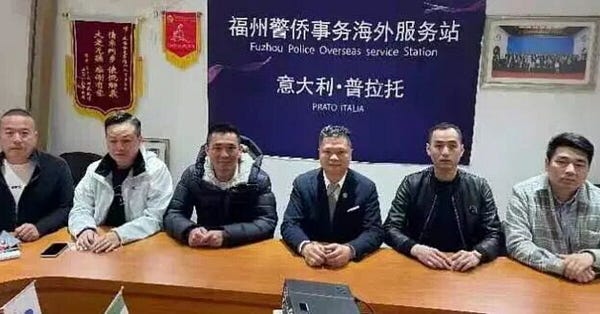Australia to investigate TikTok; Xi's elusive goal of controlling Central Asia
and more Chinese policemen in Italy. (Yes, you read that right)
*Note: Some of the links won’t work if you have a VPN on.
Happy weekend, our fellow China watchers. The middle powers have had a busy week with China. We see stories regarding the UN human rights report on Uyghurs keep unfolding in the west: The EU reportedly proposed a ban on forced labour products on Friday; Switzerland said it "summoned" the envoy to express concerns about the human rights issues in Xinjiang, but then retracted the statement and claimed the meeting was not a “summon”.
On a broader scale, we see a flurry of economic and political actions from the middle powers to counter China. Let’s dive in.
Australia to investigate Tiktok
Australia Home Affairs Minister Clare O’Neil has asked her department to investigate data collection practices at Tiktok, WeChat and other social media companies to combat foreign interference. O’Neil instructed Home Affairs to come back with a briefing by 2023 on possible options to tackle questionable data harvesting but confirmed the Australian government was not considering banning Tiktok– a move touted by the Trump administration then shelved by President Biden.

O’Neil’s decision didn’t come as a total surprise as the Australian media had reported extensively that employees at Tiktok’s Beijing-based parent company in China can access personal information of Australians.
O’Neil, who is also the cyber security minister, revealed she is looking at the “next phase” of work to fight foreign interference in Australia.
“The fact that we’ve got millions of Australians accessing an app where the usage of their data is questionable is very much a modern security challenge for the country and no country in the world has found the easy solution for managing this.”
On the same day O’Neil’s decision was reported, Australian Liberal senator James Paterson, opposition spokesman on cyber security, told the media the government shouldn’t rule out banning TikTok and other China-based social media companies before a formal review of their alleged data-harvesting practices have been completed.
O’Neil’s right in saying that no democratic country has found a good solution to tackle this issue. The U.S. for one has been back and forth on whether to ban the app or not. But the suspicions over the app’s murky relationship with the Chinese government are widely shared in the west. In July, leaders of the U.S. intelligence committee called on the Federal Trade Commission to investigate after reports detailed how China-based engineers had access to TikTok’s U.S. user data.
Despite the widely-shared suspicion over the app’s data collection practices, the middle powers have yet to find a consensus on how to tackle the national security threats posed by it.
More Chinese policemen in Italy
An Italian news report about a Chinese police station has been trending on Twitter.


The story reveals the establishment of a Chinese police station in the Italian city of Prato in Tuscany. The opening of the centre, called the Fuzhou Overseas Police Station, was officially announced in late March. Fuzhou is the capital of China's Fujian province, one of the biggest exporters of Chinese immigrants to Italy.
Here’s a little bit more on the nature of this overseas police station.
According to Xinhua News, a Chinese government-affiliate newspaper, the station is meant to provide services to overseas Chinese nationals from Fuzhou “while cracking down on crimes and illegal activities involving this group”. As most China watchers know, Chinese laws such as the national security law, are loosely defined and are often used by the Chinese government to hunt down political dissidents.
The history of the police-force collaboration goes back to 2016 when Italian and Chinese police worked together on joint patrols on the streets of Rome and Milan. The unusual experiment was designed to manage the flooding of Chinese tourists (about 3 million a year then) to Italy.
But don’t feel discouraged, yet. The following news from Italy should give you some hope.
A spokesperson of Brothers of Italy, a right-wing party, said a conservative Italian government would conduct a thorough review of the controversial “Belt and Road” pact with China when it expires.
The right-wing bloc is reportedly on track to win a clear majority in both houses of parliament at this month's election.
Italy is the first and only G7 member to have signed up to China’s infrastructure project, with a memorandum of understanding endorsed in 2019 by then Prime Minister Giuseppe Conte.
Decoupling from China is the order of the day for German industry

Germany's economy ministry is considering a range of measures to steer away from China economically and diversify its trade partners.
The measures include reducing or even cancelling investment and export guarantees for China as well as halting the promotion of trade fairs and manager training in China. Screening Chinese investments in Germany and vice versa is also part of the ministry’s plan. The government, along with other G7 countries, might also submit a complaint to the World Trade Organization about what it views as unfair Chinese trade practices.
The Communist-ruled state has been Germany’s biggest trading partner for the past six years, with transactions that totalled €245.9 billion (US$356 billion) in 2021. The German economy is much more dependent on China than the other way around and German investment in China kept going between January and June, according to an August study by the German Economic Institute.
The changes, if finalized, would take Germany one step further in its attempt to decrease its dependence on China. German Foreign Minister Annalena Baerbock has been an advocate for pivoting away from China since the Merkel administration.
And Chancellor Olaf Scholz, unlike his predecessor who adopted a mixed approach on the superpower, has a tougher stance on China.
Earlier this year, the coalition declined to extend an investment guarantee for a Volkswagen plant in China’s Xinjiang region, where the Chinese Communist Party’s repression of Uyghurs and other minorities has been deemed a crime against humanity.
Business leaders in Germany are setting their sights on other Asian markets. The Federation of German Industry (BDI) recently urged its members to look beyond Beijing during a conference attended by some of the country’s largest investors in China including the automotive, mechanical, and chemical engineering sectors. BDI, Germany’s leading business lobby group, called for cutting dependence on China in 2018
Of course, the private sector is increasingly wary of any decoupling from China. 👇
"We cannot isolate China," Hildegard Mueller, the head of the German autos association VDA, told digital outlet Table Media. "That would be naive – and fatal, both politically and economically."
Central Asia is high on Xi Jinping’s radar
After months of speculation, we finally know the location of Chinese President Xi Jinping’s first overseas trip since the start of the pandemic. Kazakhstan.
Xi will visit the central Asian country on Sept. 14 to sign a number of bilateral documents. The Chinese president might follow up the visit with another Central Asian stop in Uzbekistan, to attend the Shanghai Cooperation Organization summit on Sept. 15 and 16.
Why Kazakhstan? The middle power’s strategic location between China and Europe as well as its oil and mineral-rich reserves make it an especially important neighbour for the Chinese Communist Party. In 2013, President Xi Jingping announced the Belt and Road Initiative during his visit to Kazakhstan, marking CCP’s ambitious plan to expand its power through massive infrastructure projects stretching from Asia to Europe and parts of Africa.
Securing a crucial transit hub and energy source is key not only for Beijing’s economic growth and diversification but also provides the CCP with the resources it needs to surveil and control Muslim minorities in Xinjiang.
China’s ambition and the obstacles ahead
Xi’s decision to make Kazakhstan his first overseas stop after two and a half years shows how important the region is to him. But realizing his ambitions might prove to be difficult.
For one, despite the Kazakh government’s support for China’s BRI projects, people in Kazakhstan have shown an increasingly negative sentiment towards China in recent years.
One possible explanation is reports of China’s human rights violations against ethnic Uyghurs, Kazakhs, and Kyrgyz people. Many Kazakhs have come to the conclusion that the Chinese Communist Party sees all Muslims and Turkic people as nothing more than a source of terrorism and extremism. Burdened with endemic government corruption and economic hardship, people in the former Soviet republic have been unhappy about their country’s dependence on China and its growing economic power for years. Dissatisfaction with the country’s pro-Beijing policies has sparked protests in several cities, most recently in 2021.
Meanwhile, Russia seems to have a much better grip on the country than China.
In January 2022, ignited by a decision to scrap fuel subsidies, discontent with the Kazakh government amounted to violent clashes between police and civilians. President Kassym-Jomart Tokayev asked Moscow for help, calling for troops from a Russian-led military alliance to quell the upheavals.
“Despite its recent activity and economic impact in the region, China is still a long way behind Russia in its ability to understand and influence Kazakhstan’s ruling elite,” wrote Temur Umarov, expert at the Carnegie Endowment for International Peace.
One big thing to follow next: IPAC D.C. summit
The Inter-Parliamentary Alliance on China is having its annual summit on Sep 12-14. The gathering, joined by 60 legislators, will focus on two key issues: human rights violations in China and how to safeguard Taiwan's democracy.


The middle powers will be monitoring the summit for you. Stay tuned.



